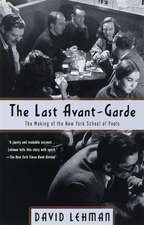The Richer, the Poorer
Autor Dorothy Westen Limba Engleză Paperback – 31 mai 1996
Preț: 118.46 lei
Nou
Puncte Express: 178
Preț estimativ în valută:
22.67€ • 23.52$ • 18.95£
22.67€ • 23.52$ • 18.95£
Carte tipărită la comandă
Livrare economică 13-19 martie
Preluare comenzi: 021 569.72.76
Specificații
ISBN-13: 9780385471466
ISBN-10: 0385471467
Pagini: 272
Dimensiuni: 140 x 217 x 17 mm
Greutate: 0.35 kg
Ediția:ANCHOR BOOKS.
Editura: Anchor Books
ISBN-10: 0385471467
Pagini: 272
Dimensiuni: 140 x 217 x 17 mm
Greutate: 0.35 kg
Ediția:ANCHOR BOOKS.
Editura: Anchor Books
Notă biografică
Dorothy West founded the Harlem Renaissance literary magazine Challenge in 1934, and New Challenge in 1937, with Richard Wright as her associate editor. She was a welfare investigator and WPA relief worker in Harlem during the Depression. Her first novel, The Living Is Easy, appeared in 1948 and remains in print. He second novel, The Wedding, was a national bestseller and literary landmark when published in the winter of 1995. A collection of her stories and autobiographical essays, The Richer, The Poorer, appeared during the summer of 1995. She lives on Martha's Vineyard.
Recenzii
"West writes like a social historian, capturing significant moments that seem to alter lives forever or change nothing at all."--Los Angeles Times
"Unforced perfection . . . beautifully cadenced. West has shown the power of what is left unspoken."--Chicago Tribune
"Dorothy West is an epic storyteller."--Quarterly Black Review of Books
"Unforced perfection . . . beautifully cadenced. West has shown the power of what is left unspoken."--Chicago Tribune
"Dorothy West is an epic storyteller."--Quarterly Black Review of Books
Descriere
On the heels of the bestseller success of The Wedding, Dorothy West, the last surviving member of the Harlem Renaissance, presents a collection of essays and stories which explores both the realism of everyday life and the fantastical, extraordinary circumstances of one woman's life in a mythic time. "An intimate glimpse of both the virtures and the vices of the African-American middle class".--New York Times Book Review.
















